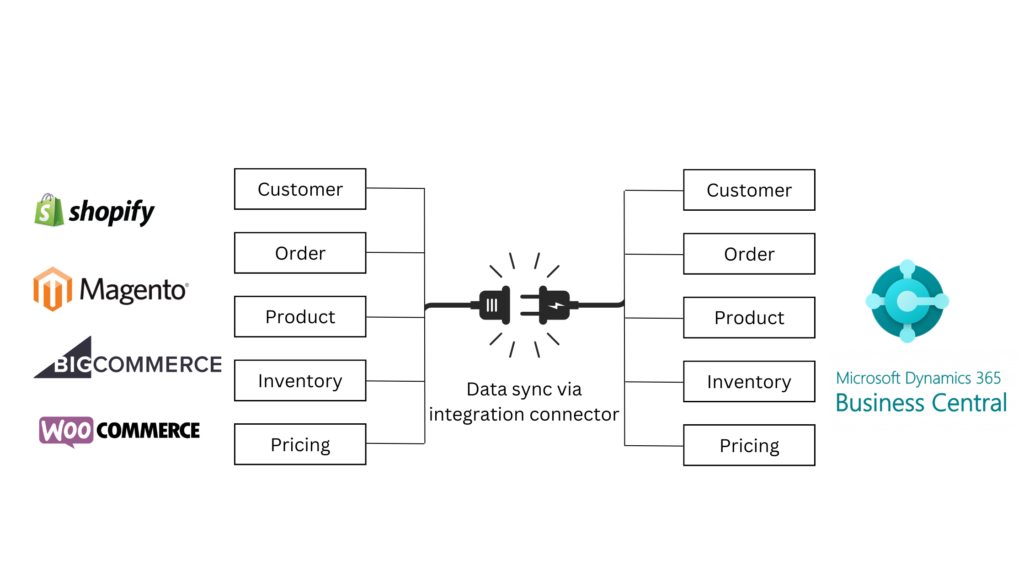Enterprise Resource Planning (ERP) solutions have evolved to become indispensable not only for large global corporations but also for small and medium-sized enterprises (SMEs). Whether you run an online business, a brick-and-mortar store, or a multinational enterprise, efficient operations management is crucial. This holds especially true for eCommerce businesses, where streamlining processes through ERP integration is key to sustainable growth and success. Let’s explore how ERP eCommerce integration can transform your business.
Key benefits of ERP for eCommerce
Implementing an Enterprise Resource Planning (ERP) system in an eCommerce business can offer several key benefits, including:
- Streamlined operations: ERP systems integrate various business processes, such as inventory management, order processing, and financials. This streamlines operations and reduces manual data entry, leading to increased efficiency.
- Real-time Data: ERP provides real-time access to critical data, enabling businesses to make informed decisions promptly. This is crucial in eCommerce for managing inventory, analyzing customer behavior, and adjusting pricing strategies.
- Inventory Management: ERP helps optimize inventory levels, reducing carrying costs and preventing overstock or stockouts. This is especially important in eCommerce, where accurate inventory management is essential.
- Improved Customer Service: With access to customer data and order histories, eCommerce businesses can offer better customer service. ERP systems allow for quicker response times to inquiries and enable personalized interactions.
- Multi-Channel Integration: ERP can integrate with various eCommerce platforms and marketplaces, helping businesses manage multiple sales channels efficiently and ensuring consistent product information across platforms.
- Financial Management: ERP systems provide robust financial tools, including accounting, invoicing, and financial reporting. This helps eCommerce businesses maintain financial accuracy and compliance.
- Data Analytics: ERP systems often include built-in analytics and reporting tools, allowing businesses to gain insights into sales trends, customer behavior, and other critical metrics, which can inform marketing and sales strategies.
- Scalability: As eCommerce businesses grow, ERP systems can scale with them, accommodating increased transaction volumes, additional product lines, and more complex operations.
- Compliance and Security: ERP systems can help eCommerce businesses maintain regulatory compliance and data security standards, which are essential in industries with sensitive customer data.
- Improved Vendor and Supplier Relationships: ERP systems can help manage supplier relationships, optimizing procurement processes and ensuring timely deliveries of products, crucial for eCommerce businesses.
Important ERP features for successful eCommerce integration
Successful ecommerce and ERP integration help businesses transfer information quickly and with accuracy. When considering an ERP solution for eCommerce, it’s essential to keep these critical ERP features in mind:
CRM (Customer Relationship Management)
Effective CRM software assists in nurturing leads and retaining customers. Features such as online help desks, targeted advertising, and efficient order notifications contribute to customer satisfaction and loyalty.
Finance
Financial management and accounting tools are the core of ERP systems. Financial data is key to centralizing processes and developing efficient forecasting models so that you can plan for product reorders and anticipate delivery lead times. In addition, financial information helps you keep track of vendors you’re working with and customers who own a balance.
If you are already using accounting software for your eCommerce business, you should consider integrating it with a full-blown ERP system instead so that your data is more detailed and insights are reflected across departments.
Inventory management
What separates eCommerce from a brick and mortar retail are the volume of sales and the number of products available. Therefore, inventory levels need to be accurate to be able to fulfill the order immediately. Since this industry requires speed and accuracy, it’s crucial that real-time data like inventory is a part of your system.
Shipping/distribution
You can automate the complete process of choosing the shipping partner to print barcodes and track shipments. Since no manual data entry is involved, you will get error-free, cost-effective, and punctual shipping management.

Choosing the right eCommerce integration solution
When selection an eCommerce integration for Dynamics 365, consider the following factors:
- Ease of implementation: Choose a solution that is easy to implement and configure, minimizing downtime and disruption to your business operations.
- Scalability: Ensure the solution can scale to meet your growing needs, accommodating future growth in product catalog, customer base, and order volume.
- Security: Prioritize a solution that meets your data security requirements, ensuring sensitive customer data and financial information is protected.
- Integration capabilities: Evaluate the solutions ability to integrate with your existing eCommerce platform and Dynamics 265 environment.
- Vendor support: Choose a vendor with a proven track record of providing reliable support and assistance, ensuring you have the resources to address any technical challenges that may arise.
Read more: Top Dynamics 365 Integration Platforms
eCommerce Integration with Dynamics 365
Dynamics 365 is a valuable asset for enhancing various aspects of operation and can be applied to any business size. It excels in supply chain management, inventory, distribution logistics, and maintenance management, helping businesses streamline these critical functions.
Dynamics 365 offers seamless integration with a wide array of eCommerce platforms, fostering a cohesive and efficient online retail environment. Some notable eCommerce platforms that can integrate seamlessly with Dynamics 365 include:
1. Shopify
2. Magento
3. BigCommerce
4. WooCommerce
Dynamics 365 Shopify Integration
Shopify’s integration with Dynamics 365 facilitates a seamless collaboration between these two platforms, enabling businesses to streamline their operations efficiently. The synchronization capabilities extend beyond just product information, encompassing crucial aspects such as inventory levels and order processing. This integration ensures that any changes made in Shopify, whether it be updates to product details or modifications in inventory levels, are automatically reflected in Dynamics 365. Consequently, businesses can maintain accurate and up-to-date records across both platforms, reducing the risk of discrepancies or errors in data management.
Shopify already has a built-in connector with Business Central, eliminating the need for a third-party ISV to integrate this connection with Dynamics 365. The synchronized order processing feature ensures a smooth transition from online transactions on Shopify to the backend system in Dynamics 365, enhancing overall efficiency in managing sales and fulfillment processes. This interconnectivity proves invaluable for businesses looking to enhance their e-commerce operations while seamlessly integrating with their broader enterprise resource planning (ERP) systems.
Dynamics 365 Magento Integration
Magento is an open-source eCommerce platform ideal for established medium to large sized businesses. It is optimized to work with thousands of products, tons of traffic and a big number of sales.
Known for its flexibility and scalability, Magento seamlessly integrates with Dynamics 365, enabling businesses to manage complex product catalogs, customer data, and transactions with ease.
This integration goes beyond mere synchronization, offering a platform for businesses to handle a diverse range of products and variants. The synergy extends to customer data, allowing seamless flow and updating of customer information between Magento and Dynamics 365. The integration also optimizes transaction management, facilitating a streamlined process for order processing, payment tracking, and invoicing.
Dynamics 365 BigCommerce integration
BigCommerce is ideal for fast growing big corporations because of its viable and powerful interface. It’s perfect for users with little technical knowledge due to its comprehensive list of built-in features.
With Dynamics 365 integration, BigCommerce offers an optimized eCommerce experience. This combination facilitates efficient order management, ensuring that businesses can seamlessly process and fulfill customer orders with precision and speed. The integration also enhances inventory tracking capabilities, enabling real-time updates on stock levels and ensuring businesses maintain accurate and up-to-date information on product availability. Additionally, the collaboration extends to customer relationship management, creating a unified system for tracking and managing customer interactions, preferences, and history. This not only streamlines customer service but also empowers businesses with valuable insights for personalized marketing and engagement strategies.
Dynamics 365 WooCommerce integration
WooCommerce is a free WordPress e-commerce plugin and can be used with any WordPress theme. It’s easy to install and fully customizable with tons of free and paid extensions and themes. WooCommerce is ideal for business owners already having and being familiar with a WordPress site.
The integration between WooCommerce and Dynamics 365 streamlines product management, allowing businesses to efficiently update and showcase their offerings online. Furthermore, it enhances order processing, facilitating smooth and accurate transactions, from customer selection to payment processing. The synchronization of customer data ensures a holistic view of customer interactions, enabling personalized engagement and targeted marketing strategies.
So, how does an eCommerce integration with Dynamics 365 work?
An eCommerce integration with Dynamics 365 typically involves utilizing a connecting application designed to facilitate the synchronization of data. This integration enables seamless data flow between the two systems, ensuring that information such as product details, inventory levels, orders, and customer data is synchronized in real time. There are several third-party providers offering connecting applications for this purpose, and the choice of provider depends on the specific needs and requirements of the business.
When a customer places an order on your eCommerce platform, the integration automatically creates a corresponding sales order in Dynamics 365. Inventory levels are updated in both systems to reflect the sale, ensuring that you have accurate stock information across all channels.
Customer data is also synchronized, allowing you to track customer interactions and provide personalized experiences based on their purchase history. This integration streamlines operations, reduces manual data entry, and helps you make informed decisions by providing a unified view of your eCommerce and ERP data.

- Sync Customer Data: Seamlessly integrate customer data from your eCommerce store with Business Central, ensuring a unified customer view across platforms.
- Sync Orders: Automate the synchronization of orders directly with Business Central, reducing manual entry and ensuring accurate order processing.
- Sync Product Information: Sync essential product details like SKU, titles, descriptions, and pricing between your eCommerce platform and Business Central, maintaining consistency across channels.
- Inventory Management: Keep an accurate inventory by synchronizing stock levels between your eCommerce store and Business Central, enabling efficient stock control.
- Enhanced Customer Experience: Improve customer experience by automatically updating customers about their order and shipment statuses, increasing transparency and satisfaction.
- Financial Organization: Organize finances more effectively with improved invoice tracking, payments, and tax information management through integration with Business Central.
Read more: Integrate Microsoft Dynamics 365 with PIM
The best eCommerce ERP integration
eCommerce integration with Dynamics 365 empowers businesses to streamline operations, enhance customer experiences, and gain valuable data-driven insights. By unifying their online and back-office systems, businesses can unlock the true potential of unified commerce, driving growth and profitability.
Which eCommerce platform is best for you can only be decided by the industry you operate in, the requirements of your customers, and your business budget. All eCommerce platforms mentioned above can be integrated with Dynamics 365 to enable automated synchronization accurately and save valuable time and cost.
Reports show that 95% of businesses see an improvement in some or all of their processes after implementing an ERP solution. Because eCommerce businesses perform operations quickly and at high volume, a reliable solution with automation capabilities can benefit greatly.
Read our case study on how we helped Sanrio transition from a legacy ERP solution to Microsoft Dynamics 365.
Ready to integrate your eCommerce store with ERP software? Contact Us Today.

